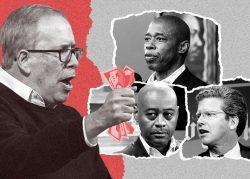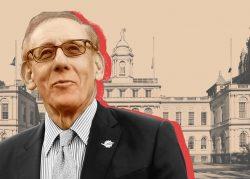The top mayoral hopefuls agree that more affordable housing for the lowest-income New Yorkers is needed. But the details on how best to do that get a bit fuzzy.
During the first televised mayoral forum of the 2021 race, NY1 host Errol Louis asked the Democratic candidates if they would provide a “hard number expressed as household income of the kinds of families” their affordable housing programs would target and if housing that targets families earning income “even slightly higher” than the area’s average constituted gentrification. Most of the eight participating candidates largely stuck to their scripts on their publicly announced housing plans and didn’t address the gentrification question directly.
Read more



Shaun Donovan, who served as the top housing official for Mayor Michael Bloomberg before serving as President Barack Obama’s secretary of Housing and Urban Development,
stressed that federal rental assistance programs will be key to helping families who earn less than $15,000 a year.
“The single-most important answer for our lowest-income families, who need the help the most, is to dramatically expand help from Section 8 and other rental assistance that will allow you to pay the bills,” he said.
Ray McGuire, a former vice chairman at Citigroup, said the government and nonprofits need to take the lead in building housing for those earning below 30 percent of the area median income. He estimated that it would cost $1 billion to build 5,300 units for those New Yorkers.
One-time presidential candidate Andrew Yang said he had a more cost-effective solution involving city grants that would pay for turning vacant or defunct hotels into affordable housing. He said he could build roughly 5,000 housing units by investing $250 million in such conversions. Maya Wiley, attorney and civil rights activist, also floated hotel conversions as part of her affordable housing strategy.
Comptroller Scott Stringer criticized the de Blasio’s administration’s housing program for failing to build more deeply affordable housing. Stringer, who has proposed requiring nearly all residential development to set aside 25 percent of units for those making an average of 60 percent of AMI, said the administration has failed to work with community boards and residents and wasn’t interested “in building consensus” in the neighborhoods it rezoned.
Drilling down on his initial question, Louis asked if every new unit in East New York, one of the neighborhoods rezoned under de Blasio’s Mandatory Inclusionary Housing program, should be affordable to existing residents.
“If a housing policy results in long-term residents being pushed out of homes and into homeless shelters, I got a real problem with that,” Stringer said. “I’m not suggesting that we don’t recognize the pulse and excitement of neighborhoods that are constantly changing… but there has to be a basic understanding that the people who invested a lifetime in communities, built the schools and daycare centers, that made communities so vital that people from all over the world want to live there, you’ve got to make sure that there is a place for them.”
Kathryn Garcia, former city sanitation commissioner, agreed that the value of federal vouchers needs to be increased and said that affordable housing needs to target those who make less than 30 percent of the area median income. She also called the city’s land use review process, the Uniform Land Use Review Procedure, “very bureaucratic” and said the city needs to do a better job of prioritizing its own projects.
“If, when I was a sitting commissioner needed to get an expeditor to get my projects through, then we know that we need to change things,” she said. “In construction, time is money.”
She added that the city needs to support small landlords to ensure that they are able to afford maintenance in rent-stabilized buildings. Landlords have lamented that the state legislature’s changes to the rent law in 2019 leaves them with little to cover those costs.
Nonprofit executive Dianne Morales echoed that housing needs to target tenants earning less than 30 percent of the area median income, and said the city needs to prioritize affordable housing developed by nonprofits.
She also called out the city’s shelter system.
“It is a process that churns people into whatever housing is available without ensuring that they are actually able to retain that housing long-term,” she said.
Brooklyn Borough President Eric Adams said when it comes to affordable housing, the city needs a more coordinated approach. He also emphasized that more affordable housing needs to target “middle-income” New Yorkers.
“Everybody keeps looking for this magic dollar amount, but in actuality if you are a teacher or an accountant and have four or five children, and you are paying above 30 percent of your income on rent, that is unfair,” he said. “We’re not talking about multimillionaires, we’re talking about hard-working, civil service, middle income people who are paying 40, 50 percent of their income on rent.”
The candidates diverged on how to address the New York City Housing Authority’s $40 billion in needed repairs. Donovan and Garcia voiced support for the recently announced “Blueprint for Change,” a plan to overhaul the agency’s management system. The other candidates expressed concern about shifting control of public housing to private companies.
At the very end of the forum, the conversation turned to how the candidates would address housing discrimination. When asked if the city’s community preference policy exacerbates discrimination, Adams, Garcia and McGuire agreed that it does. The policy, which requires that local residents get dibs on half of affordable units in new projects, is the subject of an ongoing lawsuit against the city. Adams said the policy needs to be eliminated in affluent communities.
Other candidates opted not to directly address the policy but said upzonings in the city need to target more affluent areas. Garcia also suggested that she would reform zoning policies that discourage multifamily housing, pointing to two- and three-family zoning. She has previously said she would move away from single-family zoning, which exists in parts of Queens and Staten Island.
The issue of “cancel rent,” a campaign led by housing advocates seeking forgiveness of rent debt, also came up during the forum. Advocates have pushed for a state policy that would forgive rent and Wiley suggested small landlords could be granted tax abatements and subsidies in exchange for agreeing not to evict tenants. Stringer said part of the federal stimulus needs to be dedicated to cancelling rent for the poorest New Yorkers.
“In this conversation about cancelling rent, people forget that the greatest level of wealth for Black, Brown and immigrant communities, that wealth is in their households, their homes,” Adams said. “We would see the greatest devastation on Black and Brown wealth if we push cancel rent without balancing that out with real assistance for landlords to pay the utility bills.”
